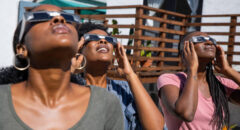
When the sun is hidden away behind a set of lumpy clouds on an overcast day, many people choose to leave the sunglasses behind and grab an umbrella instead, but even on cloudy days, eye health is important. Believe it or not, sunglasses can be and should be worn during overcast days during daylight.
Why you should wear sunglasses on cloudy days
You may be asking yourself, “why should I wear sunglasses if I can’t see the sun?”
Ever notice how even on a cloudy day, the world around us is still lit up with light that enables us to see during the daylight hours?
Well, even though the sun is hiding behind an atmosphere of clouds, its effects on temperature, atmospheric pressure, and our eyes are still present.
When the sun shines through a layer of dense clouds, the atmosphere acts as an incubator for UV rays, making them even more intense than when the sun is shining bright in all its glory.
Studies show that partially cloudy skies raise surface UVB levels by 25 percent and the UVB rays associated with DNA damage are 40 percent stronger.
Overexposure to UV rays can cause damage to the eyes over time.
Many people protect their skin from getting sunburned by wearing sunscreen but aren’t aware that their eyes can become sunburnt as well.
Sunburnt eyes may become red, dry, painful, and gritty and lead to permanent eye damage such as cataracts, macular degeneration, corneal sunburn, and some eye cancers.
Obviously, we can’t go around rubbing sunscreen on our eyes, so it is important to protect our eyes with








